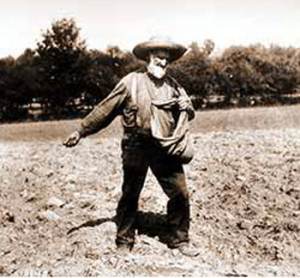Last night in church the parable of the sower was read. “A sower went forth to sow.” I tried to think of modern day equivalents.
A Web developer went out to SEO.
The mechanic went out to tow.
A guitarist went out to solo.
It just doesn’t work.
It seems that some timeless truths can only find equal in God’s own creation. This does seem to make good sense, that one should define timeless truth with timeless design.
I have often thought that I should craft my own parables to strengthen my ability to drive home a point. This has not gone well for me. “The Parable of the Dirty Car”, or “Heaven is like a MacBook” doesn’t have impact like the “Parable of the Lost Sheep.” Jesus wins again. 14,341 to 0.
I wonder how his brothers felt. Jesus was undefeated at Hide And Seek and Water Polo.
I digress.
To describe the Holy Spirit, various nature references are used by Jesus and others. John the Baptist said that Christ would cleanse with “the Holy Ghost and fire,” a description echoed in Luke’s description of the sanctification of the apostles and disciples on the Day of Pentecost. Jesus told Nicodemus that the Holy Spirit is like the wind – you can’t see either one, but you can surely see and feel their effects. This also is found on the Day of Pentecost, when “suddenly their came a sound from Heaven, as of a rushing mighty wind.” Jesus stood up on the “great day” of the Feast of Tabernacles and cried out “whosoever believeth on me, out of his belly shall flow rivers of living water.” The writer continues, “this spake he of the Spirit…”
Here again, it only makes sense that the author of Creation would use what he had designed and made to describe the spiritual realm to the people he had also created. How could he use human things to describe Godly things? The things they built rotted and fell down. Their money and kingdoms and societies and power came and went. “The Spirit is like this Roman chariot.” Again, it just doesn’t work. Even the Roman language died.
“But wait,” you may say, “didn’t Jesus use people in his parables?” Right you are, my good friend. And who is it again, exactly, that made people?
Jesus: 14,342 to 0.
His poor brothers.




